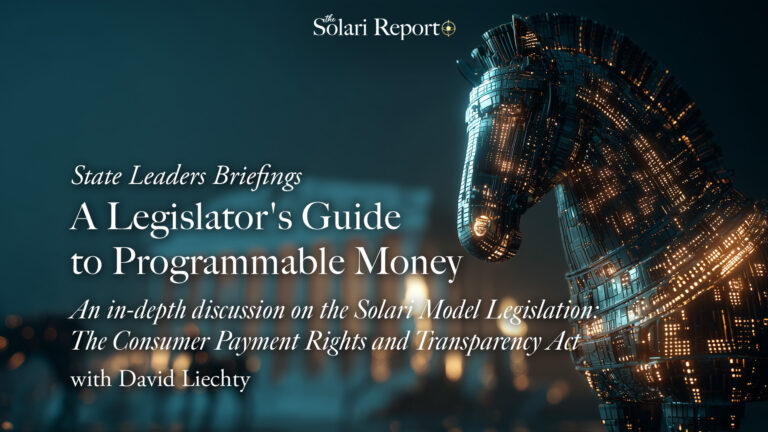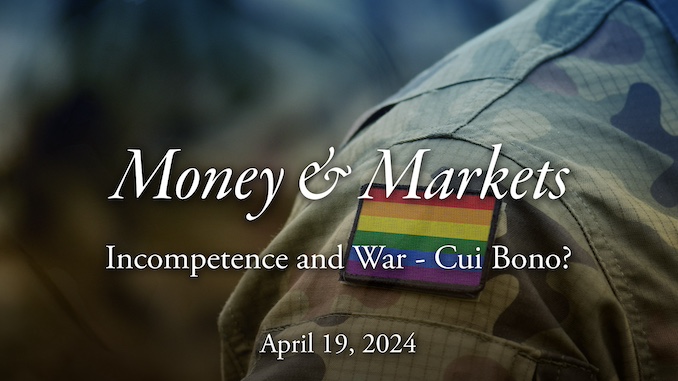Short Preview
Solari’s weekly Money & Markets reports are hosted by Catherine Austin Fitts and John Titus. Catherine and John discuss the latest financial and geopolitical news—each week summarized by an evocative theme—and monitor significant trends in areas such as “Fed Watch,” “Space, Military, and Global Turf Wars,” “Hey Robot,” and “Pharmageddon.” They also track and celebrate noteworthy pushback around the world. Money & Markets is published on Thursday evenings, with the exception of the last week of the month. Subscribers can access Money & Markets in either audio or video formats (both downloadable).

Already a subscriber? Log in
New to the Solari Report? Check out our Welcome Page
Not a subscriber yet? Subscribe now
With a Solari Report subscription, you get access to:
- ✔ The popular and informative Money & Markets show co-hosted by Catherine Austin Fitts and John Titus
- ✔ Weekly interviews with top guests, and quarterly deep dives into major trends affecting you day-to-day
- ✔ Aggregation of the most relevant news stories
- ✔ Subscriber-only events and a digital platform to connect with other subscribers
128 Comments
Comments are closed.




















































































































All the senators who voted yes on the unconstitutional FISA bill yesterday evening:
https://www.senate.gov/legislative/LIS/roll_call_votes/vote1182/vote_118_2_00150.htm#top
The trend with Boeing, the magistrate judge, and other stories is that dishonesty is being rewarded and rising to the top. I wonder where the threshold is where we are no longer able to maintain a complex economy. You can’t build airplanes when middle management is lying about whether quality control of the components was properly done. This is also reminiscent of the Feynman’s study of the Challenger disaster, showing that dishonesty and mismanagement compounded in a failure that blew up the entire rocket.
“The answers from the engineers all said, in one form or another: one in about 200 [chance of failure]. [the manager’s confidence:] 100 percent.”
https://calteches.library.caltech.edu/3570/1/Feynman.pdf
The trend with Boeing, the magistrate judge, and other stories is that dishonesty is being rewarded and rising to the top. I wonder where the threshold is where we are no longer able to maintain a complex economy. You can’t build airplanes when middle management is lying about whether quality control of the components was properly done. This is also reminiscent of the Feynman’s study of the Challenger disaster, showing that dishonesty and mismanagement compounded in a failure that blew up the entire rocket.
“The answers from the engineers all said, in one form or another: one in about 200 [chance of failure]. [the manager’s confidence:] 100 percent.”
https://calteches.library.caltech.edu/3570/1/Feynman.pdf
Went to a logistics conference last week, heard people talking that the Baltimore Bridge accident and barges set loose incident are suspected to be “terrorist” acts. Also more of such incidents are expected to disrupt transport in the future. It really doesn’t matter what the headline news reports. People working in that industry know what is going on.
Went to a logistics conference last week, heard people talking that the Baltimore Bridge accident and barges set loose incident are suspected to be “terrorist” acts. Also more of such incidents are expected to disrupt transport in the future. It really doesn’t matter what the headline news reports. People working in that industry know what is going on.
Interesting presentation Harvard Business School – wow this is going fast!
I’ll be listening in.
“I learned more from this speaker in one hour, than from any other I’ve heard”
All In on AI for People and Organizations | Thomas H. Davenport / May | MIT Press
The HBSAB and MIT Press invite you to join us on. Many companies are dipping their toes into artificial intelligence, but only a few are attempting to put AI at the core of their strategies and business models. Similarly, many individuals are experimenting with AI use, but haven’t fully embedded the technology into their work. Drawing from his two most recent books, Tom Davenport will describe what companies and individuals that aspire to be “all in on AI” do, and the types of outcomes they can achieve. Though these organizations represent less than 1 percent of large companies, they are all high performers in their industries. They have better business models, make better decisions, have better relationships with their customers, offer better products and services, and command higher prices.
“The last thing that I would have ever imagined,” Dr. Davenport later recalled, “was that people would start losing their jobs because of some ideas that I was offering.”
https://www.strategy-business.com/article/19570
Now, the people are less important to the pushers of the ai movement.
Interesting presentation Harvard Business School – wow this is going fast!
I’ll be listening in.
“I learned more from this speaker in one hour, than from any other I’ve heard”
All In on AI for People and Organizations | Thomas H. Davenport / May | MIT Press
The HBSAB and MIT Press invite you to join us on. Many companies are dipping their toes into artificial intelligence, but only a few are attempting to put AI at the core of their strategies and business models. Similarly, many individuals are experimenting with AI use, but haven’t fully embedded the technology into their work. Drawing from his two most recent books, Tom Davenport will describe what companies and individuals that aspire to be “all in on AI” do, and the types of outcomes they can achieve. Though these organizations represent less than 1 percent of large companies, they are all high performers in their industries. They have better business models, make better decisions, have better relationships with their customers, offer better products and services, and command higher prices.
“The last thing that I would have ever imagined,” Dr. Davenport later recalled, “was that people would start losing their jobs because of some ideas that I was offering.”
https://www.strategy-business.com/article/19570
Now, the people are less important to the pushers of the ai movement.